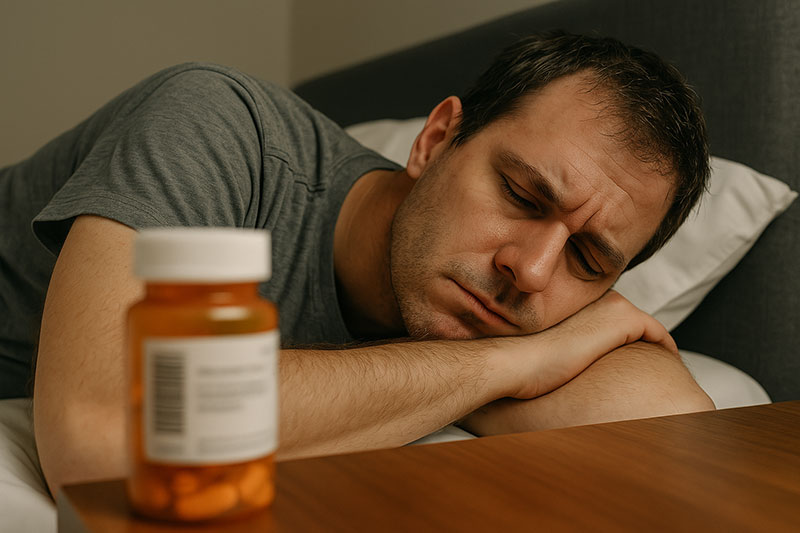Does Lexapro Make You Tired? A Doctor’s Guide to Lexapro and Fatigue
“Medicine sometimes snatches away health, sometimes gives it.”
— Ovid

When patients begin Lexapro (escitalopram), one of the most common concerns I hear in the clinic is:
“Why do I feel so tired?”
Fatigue is among the most reported side effects of this antidepressant, but does Lexapro make you tired—or is something else going on? As a prescribing physician, I’ve seen how Lexapro can help turn the tide in managing anxiety and depression, but the journey isn’t always linear. In this article, I’ll walk you through the relationship between Lexapro and tiredness—what’s normal, when it fades, and what you can do about it.
What Is Lexapro and How Does It Work?
Lexapro is part of the selective serotonin reuptake inhibitor (SSRI) family—medications commonly prescribed to treat major depressive disorder (MDD) and generalized anxiety disorder (GAD). It works by increasing the availability of serotonin, a neurotransmitter that plays a role in mood regulation, sleep, energy levels, and focus.
But here’s the tricky part: serotonin doesn’t just influence mood—it also affects your sleep-wake cycle, which is why some people feel sleepy or fatigued when starting Lexapro.
“When serotonin is stabilized, sleep can become more restful—but in the adjustment period, the opposite can happen.” — Dr. Michael Thase, Professor of Psychiatry, University of Pennsylvania
Can Lexapro Make You Feel Tired?
In short, Lexapro can cause tiredness, especially in the first few weeks after starting or changing your dose.
Why Lexapro Might Cause Fatigue:
Initial neurotransmitter shift – Your brain needs time to adjust to changes in serotonin availability.
Mild sedation effect – Though Lexapro isn’t a sedative, it can have a calming effect on your central nervous system.
Sleep disruption – Some patients report vivid dreams or waking up more frequently.
Underlying depression – Fatigue can also be a lingering symptom of the condition being treated.
According to a clinical study published in CNS Drugs, approximately 10–15% of Lexapro users report drowsiness or fatigue in the first 2–4 weeks of use. For most, it improves with time.
What Does Fatigue From Lexapro Feel Like?
Patients have described it in different ways:
“It’s like I had just run a mental marathon. I wasn’t sleepy exactly, just heavy—like my limbs weighed more than usual.” — Karen T., 42, GAD patient
“I was foggy in the mornings, kind of like after taking Benadryl—but without the allergy relief.” — Anthony M., 35, MDD patient
If you’re nodding along, you’re not alone. These early side effects are not unusual and, in most cases, not permanent.
When Does The Tiredness Go Away?
Good news: for most patients, the tiredness fades within 2–4 weeks as your body adapts to the medication. Your brain finds a new equilibrium, and your energy tends to bounce back.
If fatigue continues beyond 6 weeks, it’s time to check in with your provider. Sometimes a dose adjustment or switching to a different SSRI—like sertraline (Zoloft) or fluoxetine (Prozac)—makes a difference.
How to Manage Lexapro-Related Tiredness
If Lexapro is making you feel like you’ve been hit by an invisible truck, there are a few things you can do:
Take it at night – If fatigue hits you during the day, consider shifting your dose to the evening (only with your doctor’s guidance).
Improve sleep hygiene – Stick to a regular sleep schedule, reduce screen time at night and avoid late caffeine.
Move your body – Light to moderate exercise can naturally boost energy levels.
Stay hydrated – Even mild dehydration can amplify fatigue.
Track your symptoms – Journaling can help you and your provider understand what’s improving and what’s not.
“Energy, like happiness, doesn’t always come from a pill. Sometimes it comes from knowing what your body needs and listening.”
— Dr. Nicole Black, MD, integrative psychiatrist
When to Contact Your Doctor
You should reach out to your healthcare provider if:
Fatigue is persistent beyond 4–6 weeks.
You experience difficulty functioning at work or in daily tasks.
You’re sleeping excessively or can’t stay awake during the day.
Tiredness is paired with confusion, low heart rate, or other unusual symptoms.
Don’t adjust your dose on your own. SSRIs work best when monitored and tailored to your response.
A Word on Alternatives
If Lexapro isn’t the right fit, you’re not out of options. Other SSRIs and antidepressants may have different energy-related effects. For example:
Wellbutrin (bupropion) – Often known for being activating rather than sedating.
Zoloft (sertraline) – May offer a gentler start for some.
Cymbalta (duloxetine) – Helpful for those with both mood and physical pain symptoms.
Choosing the right medication is not one-size-fits-all. Your age, metabolism, sleep habits, and other health conditions all come into play.
Yes, Lexapro can make you tired—especially at first. But that doesn’t mean it will stay that way. Often, the body adapts, and the benefits for mood and anxiety far outweigh the early drowsiness. That said, your experience is unique, and your treatment plan should reflect that.
Always talk with your prescriber if you’re struggling with fatigue on Lexapro. Whether it’s a dosage tweak, switching medications, or adding behavioral strategies, there are plenty of ways to restore your energy and keep your mental health journey on track.
“Healing begins with understanding—not just the mind, but the rhythm of the body that carries it.”
— Dr. Ilene Smith, MD